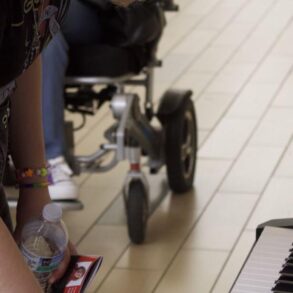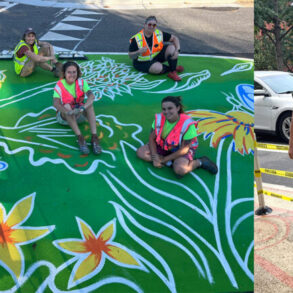Did it then lie open to the AFL to activate the notionally suspended part of his suspension and give him two more matches? Eddie McGuire thought so.
We’ll make this much allowance for Finlayson: he is maladroit in his choice of words wherever he is. It should also be noted that the podcast is called Sh!t Talkers.
Oops, sorry: Jimmy Webster bumps Jy Simpkin.Credit: Fox Footy
The NRL got going early on its apologies this year with a test run in Las Vegas. There, the Sydney Roosters’ Spencer Leniu spat out a racial slur at the Broncos’ Ezra Mam, and apologised for it, saying that anyone who knew him knew that was not who he was.
Sorry to say so, but it sure looked and sounded like him. In any case, he has eight weeks to have a good look at himself in the mirror, lest there be any mistaken identity.
I’m sorry, hand on heart:? Tiger Woods.Credit: Fairfax
The sporting apology has become a genre of its own, with dozens of sub-variants. The most innocent, marked by a raised hand, is for an errant ball toss in tennis, or a beamer in cricket. The next most innocent is from a batter to a partner they have just run out (with its subtext: I’m sorry, but not as sorry as you).
There’s the performative apology, from the soccer player to an opponent who has just been sent off, or Tiger Woods, or Lance Armstrong on Oprah. There’s the condescending apology, delivered from the victor’s dais: sorry that there had to be a loser (but thankfully it wasn’t us, you losers).
There’s the strategic apology, from a reported player to his victim, sent privately, of course, but somehow always finding its way into submissions to the tribunal.
There’s sorry now that we’ve been caught, a la Australia’s Cape Town cricketing trio. Sorry from a coach to fans, code for please let me keep my job. There’s the contemptuous apology: sorry, who are you? The ironic apology, typically delivered as a retort: sorry about all those premierships we’ve won and you haven’t.
On and on they go. Sorry for myself, sorry we ever met, sorry you were born, sorry but that’s just who I am (the obverse of sorry that’s not who I am, both serving as alibis, weirdly enough). There’s the carefully worded legal apology, made by Rugby Australia and Israel Folau to each other when their sorry days were done.
And there’s the plain bullshit sorry, as from the Russian sports minister a few years ago for the venality of athletes from his country found to have cheated under a system he devised and oversaw.
Anthony Mundine: sorry for everything.Credit: Jessica Hromas
Overarching them all is a staple, what might be called the permanent conditional all-absolving apology: if anyone was offended … Anthony Mundine, upon retirement, delivered this in omnibus form: “If I offended anybody in my career, honestly I am sincerely sorry.”
Saying sorry in sport has become a business with its own skill set. Nearly all of the above apologies were made in finely crafted statements issued corporately. It begins with a pro forma, making sure always to include families. There’s a press release, a briefing, sometimes a personal appearance. For Woods and Armstrong, there were full-scale television productions.
The way it is going, it can’t be long before an AFL club appoints a sorry coach, with an allowance under the soft cap.
But is it so regrettable that sportspeople say sorry? At least they do, unlike politicians, for instance, who are chronically incapable of admitting error or wrongdoing. Saying sorry does not come any more naturally to athletes than it does to pollies. The competitive drive needed to play top-level sport is almost inherently unapologetic.
Caitlin Clark signs autographs.Credit: Getty Images
Of course, some apologies are blatantly – dare we say unapologetically – insincere, and there is in all of them a degree of reputation and brand protection. But mostly they are made. A thoughtful and authentic apology cannot by itself right a wrong, but it is important symbolically. It is a reminder that to err is human and to forgive is almost as divine as winning the premiership.
Besides, it’s not just athletes who find themselves in the cringe bin. When American basketball sensation Caitlin Clark was unveiled this week as an Indiana Fever player, Indianapolis Star columnist Gregg Doyel made a heart sign with his hands as he asked her a question, imitating a gesture Clark makes to her family after every game, and said: “OK, well, start doing that to me and we’ll get along just fine.”
Less reported, but arguably even more crude, he asked Indiana coach Christie Sides what she would do now that she had the “keys to that”, referring to Clark.
In print, Doyel “sincerely” apologised, saying that his “heart (literally and figuratively) was well-intentioned”. You could hear the groans of women in sport from one side of the world to the other, resolving into one final form of apology, the dumbstruck, incredulous, did-I-hear-right, what-century-is-this: “Sorry?”
News, results and expert analysis from the weekend of sport sent every Monday. Sign up for our Sport newsletter.
This post was originally published on this site be sure to check out more of their content







